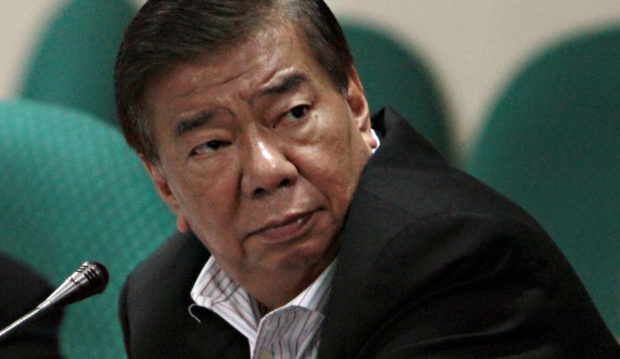‘Duterte can’t take over media under martial law’

Sen. Franklin Drilon (File photo by GRIG C. MONTEGRANDE / Philippine Daily Inquirer)
Senate Minority Leader Franklin Drilon on Wednesday challenged Malacañang’s view that the government could take over media outlets in Mindanao under martial law.
“The Bill of Rights is not suspended even if martial law is declared,” Drilon said in a text message to the Inquirer.
The Bill of Rights guarantees the freedom of expression, but according to presidential spokesperson Harry Roque, the right to free expression is not absolute.
Any derogation of the freedom of expression, however, is subject to review by the United Nations, Roque said in a telephone interview.
He said the freedom of expression could be derogated during national emergencies, as provided for under the International Covenant on Civil and Political Rights (ICCPR). “But this is subject to review,” he said.
Article continues after this advertisementRoque said the derogation must be reported to the United Nations and the reasons for it should also be given.
Article continues after this advertisementThe ICCPR states that state parties may take measures derogating from their obligations under the covenant “in time of public emergency [that] threatens the life of the nation and the existence of which is officially proclaimed.”
But the measures must not clash with the state’s other obligations under international law and do not involve discrimination solely on the ground of race, color, sex, language, religion or social origin.
The covenant also states that any party availing itself of the derogation should inform other state parties, through the intermediary of the secretary general of the United Nations, of the provisions from which it has derogated and of the reasons for this.
Advantage of martial law
The question of taking over or shutting down news organizations came up on Wednesday during the joint session of Congress on President Duterte’s request to extend his martial law declaration in Mindanao for a year.
Responding to a question by Sen. Risa Hontiveros about the advantage martial law would give to the state’s response to security threats, Deputy Executive Secretary Menardo Guevarra said the government, aided by the military, could “theoretically” be empowered to make warrantless arrests and seizures, suppress public assembly and take over the local media.
These, Guevarra said, would “serve as a warning to the citizenry that the President is exercising an extraordinary power with the assistance of the military.”
“Under pain of arrest and punishment, the citizenry is advised not to make it difficult for government forces to ensure public safety,” he said, citing his interpretation of the Supreme Court’s July 2017 decision that upheld Mr. Duterte’s Proclamation No. 216 imposing martial law and suspending the privilege of the writ of habeas corpus in Mindanao to quell an uprising by Islamic State (IS)-inspired terrorists in Marawi City.
Hontiveros had asked why the government could not just deal with the purported threat of Moro groups and communist rebels without imposing military rule and suspending the privilege.
“What is the value added of martial law? Because of its very nature, the things that may be done by the President as Commander in Chief are likewise flexible,” Guevarra told Hontiveros.
“There could be orders pursuant to the declaration of martial law that may enable warrantless arrests or seizures, or ban public assemblies, or take over media—hypothetically speaking only, Madame Senator,” he added.
Is there a ‘standard’?
Hontiveros also asked if there was a “standard” to determine if “public safety requires” the imposition of martial law in the event of a rebellion or invasion, as provided for by the Constitution.
Guevarra replied that “martial law is a flexible concept” and that “public safety is an abstract concept [that] does not have fixed standard.”
For him, whether there is basis to declare martial law is “all a matter of personal judgment of the executive” and “a prerogative that is exclusive to the Chief Executive.”
Hontiveros appeared bothered by Guevarra’s statements that hinted at the purpose of striking fear among the populace.
Explaining her vote later in rejecting Mr. Duterte’s request, she said she was “shocked” by the executive’s view, as “this is exactly the kind of thinking that plunged our country into darkness decades ago, and this is the kind of thinking that the present Constitution seeks to correct.”
“Imposing martial law every time there is a skirmish, or to create an illusory psychological effect, defeats the constitutional principle that ‘civilian authority is at all times supreme over the military,’” Hontiveros said.
“And, in the hands of a government that thinks that martial law is flexible and public safety is an abstract concept, it can only be asking for trouble,” she added.
Even as she understood the need to address the “unwarranted violence of armed nonstate actors,” particularly the New People’s Army, Hontiveros said Mr. Duterte and the communist rebels should “choose peace.”
Gabriela Rep. Emmi de Jesus likewise said the “shallow and subjective definition of ‘public safety’ and ‘rebellion’” was intended for the “repression of whoever opposes the planned dictatorship.”
Not the entire media
In an interview after the extension was approved, National Security Adviser Hermogenes Esperon clarified that the “takeover of media” stated by Guevarra referred to the halt of broadcasting during combat operations.
“It’s the media in that area. It’s not the media as a whole. For one, in the Marawi operations, if it was necessary to stop transmissions during the operations, we can stop that,” Esperon said.
“In the area, you should not announce inflammatory statements or statements that are supportive of [IS]. It’s not that there will be no media; that’s impossible,” he added.